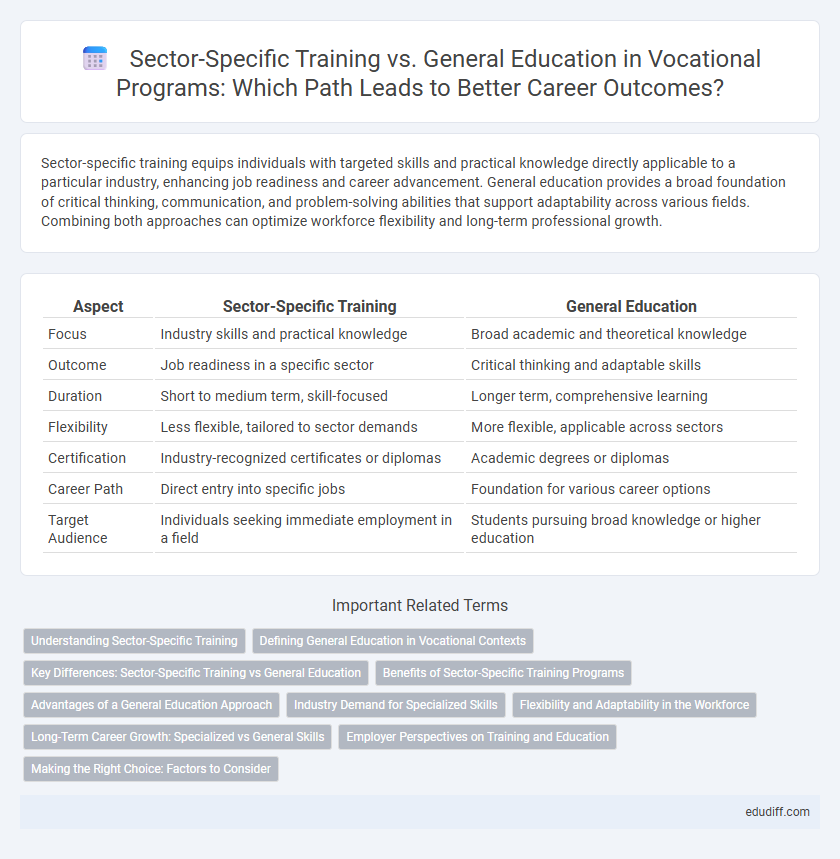Sector-specific training equips individuals with targeted skills and practical knowledge directly applicable to a particular industry, enhancing job readiness and career advancement. General education provides a broad foundation of critical thinking, communication, and problem-solving abilities that support adaptability across various fields. Combining both approaches can optimize workforce flexibility and long-term professional growth.
Table of Comparison
| Aspect | Sector-Specific Training | General Education |
|---|---|---|
| Focus | Industry skills and practical knowledge | Broad academic and theoretical knowledge |
| Outcome | Job readiness in a specific sector | Critical thinking and adaptable skills |
| Duration | Short to medium term, skill-focused | Longer term, comprehensive learning |
| Flexibility | Less flexible, tailored to sector demands | More flexible, applicable across sectors |
| Certification | Industry-recognized certificates or diplomas | Academic degrees or diplomas |
| Career Path | Direct entry into specific jobs | Foundation for various career options |
| Target Audience | Individuals seeking immediate employment in a field | Students pursuing broad knowledge or higher education |
Understanding Sector-Specific Training
Sector-specific training delivers targeted skills and hands-on experience tailored to industries such as healthcare, information technology, and manufacturing. This approach enhances job readiness by addressing precise technical demands and compliance standards unique to each sector. Focused training programs increase employability and operational efficiency, bridging the gap between general education and workforce requirements.
Defining General Education in Vocational Contexts
General education in vocational contexts provides foundational skills such as critical thinking, communication, and basic literacy, essential for adapting to various work environments. It complements sector-specific training by enhancing problem-solving abilities and fostering lifelong learning, enabling workers to navigate industry changes effectively. Emphasizing broad competencies ensures vocational learners remain versatile and prepared for diverse occupational demands.
Key Differences: Sector-Specific Training vs General Education
Sector-specific training delivers targeted skills aligned with industry standards, enhancing job readiness and practical expertise in a particular field, while general education offers broad knowledge across multiple disciplines, fostering critical thinking and adaptability. Vocational programs emphasize hands-on experience and technical proficiency, often leading directly to certification or employment in specialized sectors such as healthcare, manufacturing, or information technology. General education prioritizes foundational academic subjects, providing a versatile skill set that supports lifelong learning and interdisciplinary understanding.
Benefits of Sector-Specific Training Programs
Sector-specific training programs enhance employability by providing targeted skills aligned with industry demands, resulting in higher job placement rates compared to general education. These programs offer practical, hands-on experience with current technologies and methodologies, reducing the gap between classroom learning and workplace requirements. Employers benefit from graduates who are immediately productive, decreasing onboarding time and increasing overall workforce efficiency.
Advantages of a General Education Approach
A general education approach cultivates critical thinking, communication, and problem-solving skills applicable across various industries, enhancing adaptability in a rapidly changing job market. Broad-based knowledge fosters lifelong learning and creativity, preparing individuals to navigate complex challenges beyond immediate vocational tasks. Employers often value general education for producing well-rounded candidates capable of leadership and innovation within diverse work environments.
Industry Demand for Specialized Skills
Sector-specific training directly aligns with industry demand by equipping individuals with specialized skills tailored to particular job roles, enhancing employability in competitive markets. General education provides broad knowledge but often lacks the practical expertise required for immediate application in specialized industries. Employers prioritize candidates with targeted competencies, making sector-specific training crucial for meeting the evolving needs of industries such as healthcare, technology, and manufacturing.
Flexibility and Adaptability in the Workforce
Sector-specific training equips workers with specialized skills tailored to industry demands, enhancing immediate job performance and relevance. General education fosters critical thinking and problem-solving abilities, enabling employees to adapt across diverse roles and evolving market conditions. Combining both approaches maximizes workforce flexibility and adaptability, crucial for long-term career resilience and organizational success.
Long-Term Career Growth: Specialized vs General Skills
Sector-specific training equips individuals with specialized skills tailored to industry demands, enhancing immediate employability and expertise within a particular field. General education fosters adaptable, broad-based knowledge that supports long-term career mobility and the ability to transition across sectors. Balancing specialized training with foundational general skills optimizes sustained career growth and resilience in evolving job markets.
Employer Perspectives on Training and Education
Employers prioritize sector-specific training because it directly enhances job-ready skills and reduces onboarding time, leading to higher productivity and lower training costs. General education provides valuable critical thinking and adaptability but often requires additional on-the-job training to meet industry standards. Companies increasingly invest in targeted vocational programs to address skill gaps and improve workforce competency aligned with specific sector demands.
Making the Right Choice: Factors to Consider
Choosing between sector-specific training and general education depends on career goals, immediate job market demands, and adaptability over time. Sector-specific training offers practical skills tailored to industries like healthcare or IT, ensuring quicker employment, while general education provides broad knowledge fostering critical thinking and versatility. Consider factors like industry growth, personal learning style, and long-term career flexibility to make an informed decision.
Sector-Specific Training vs General Education Infographic

 edudiff.com
edudiff.com